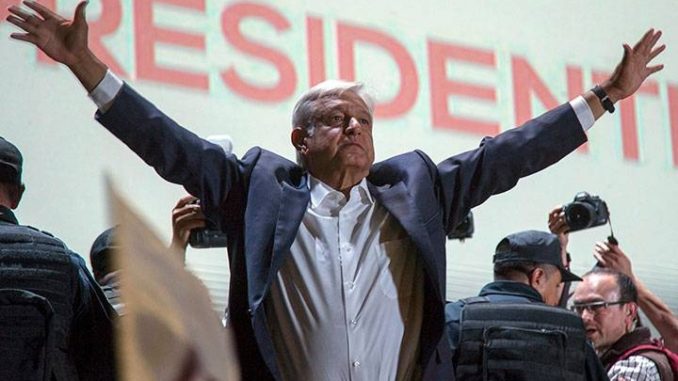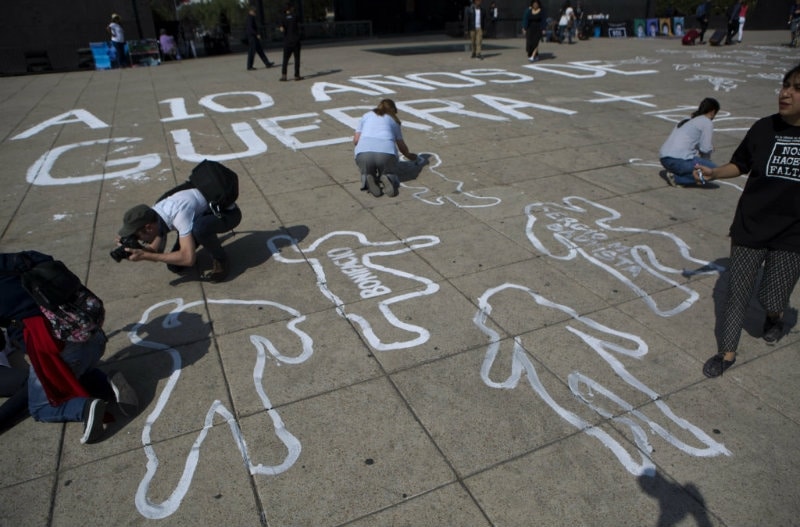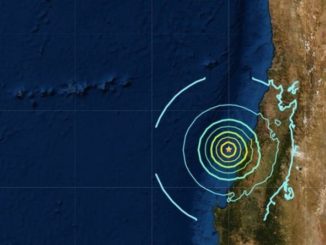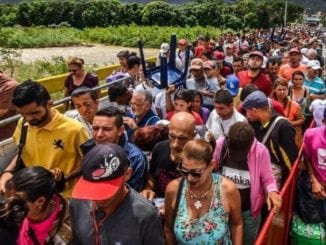
MEXICO CITY – Andrés Manuel Lopez Obrador, who rallied voters with his battle cry against corruption and promises to the poor, won a resounding victory Sunday night in Mexico’s presidential election, after the concession of his two top rivals.
The victory makes him the first left-oriented president since Mexico began its transition to democracy more than 30 years ago. López Obrador will replace President Enrique Pena Nieto, who was limited to one term in office by the constitution, on December 1.
An official “quick count” from a national sampling of ballots showed Lopez Obrador, known as AMLO, having about 53 percent of the vote, putting him well ahead his main rivals.

Exit polls also showed a decisive victory for 64-year-old veteran candidate, who has pledged to eradicate corruption and subdue drug cartels with a less confrontational approach.
According to the first official projection, Ricardo Anaya of the conservative National Action Party (PAN) won between 22.1 and 22.8 percent, Jose Antonio Meade of the ruling Institutional Revolutionary Party (PRI) between 15.7 and 16.3 percent, and independent candidate Jaime Rodriguez between 5.3 and 5.5 percent.
“Peace and tranquility are the fruit of justice,” Lopez Obrador said as he pledged “a plan of reconciliation and peace for Mexico.” He is the first presidential candidate to receive more than 50 percent of the vote in more than three decades.
“I confess that I have a legitimate ambition: I want to go down in history as a good president of Mexico,” said Lopez Obrador, who won after losses in the previous two elections.
“This new national project will seek to establish an authentic democracy and we do not intend to establish a dictatorship,” Lopez Obrador said. “The changes will be profound, but in accordance with established order.”
Mr. Obrador won over supporters with an anti-establishment platform and promises to clean up corruption, combat soaring crime levels and help millions get out of poverty. Rivals have warned he could set the country back with his interventionist economic policy.
Trump tweeted his congratulations to Lopez Obrador on Sunday night, adding: “I look very much forward to working with him. There is much to be done that will benefit both the United States and Mexico!”
Congratulations to Andres Manuel Lopez Obrador on becoming the next President of Mexico. I look very much forward to working with him. There is much to be done that will benefit both the United States and Mexico!
— Donald J. Trump (@realDonaldTrump) July 2, 2018
Trump’s anti-immigration policies, his rhetoric about Mexican migrants and anti-trade stance have plunged ties between the U.S. and Mexico to a historic low.
Lopez Obrador wrote on Twitter on Monday that he got a call from Mr. Trump and they talked for half an hour. “I proposed to explore a comprehensive agreement; of development projects that generate jobs in Mexico, thereby reducing migration and improving security. There was respectful treatment and our representatives would dialogue,” he said.
Recibí llamada de Donald Trump y conversamos durante media hora. Le propuse explorar un acuerdo integral; de proyectos de desarrollo que generen empleos en México, y con ello, reducir la migración y mejorar la seguridad. Hubo trato respetuoso y dialogarán nuestros representantes.
— Andrés Manuel (@lopezobrador_) July 2, 2018
NAFTA talks have been impeded due to the U.S. government demanding more U.S. content and a “sunset clause” for the 1994 trade agreement.
López Obrador grew up in a middle-class family in the Gulf Coast state of Tabasco and began his political career helping indigenous villagers with public works projects, which exposed him to Mexico’s glaring inequality. He broke away from the PRI in the late 1980s and joined a leftist opposition party. He grew famous as a leader of protests against voter fraud and the abuses of the state-owned oil industry.

In 2000, he became mayor of Mexico City, where he boosted social spending for single mothers, the handicapped and the elderly. Major projects, such as an elevated highway through the city, and the revitalization of downtown neighborhoods, also boosted his popularity.
López Obrador, who heads the National Regeneration Movement, or Morena, says he plans to cut government personnel and salaries and prevent funds from being squandered through corruption. He intends to use those resources to boost social programs for the poor.
No les voy a fallar pic.twitter.com/ABtjyauaoR
— Andrés Manuel (@lopezobrador_) July 2, 2018
Sunday’s elections were the largest in Mexico’s history, with voters filling more than 3,200 positions at all levels of government. Among these were 628 members of the National Congress who will be able to be reelected for the first time in nearly a century, eight state governors and mayors of more than 1,500 cities, including Mexico City.
The campaign season has been marked by violence, with some 130 candidates and campaign staff assassinated across the country.



